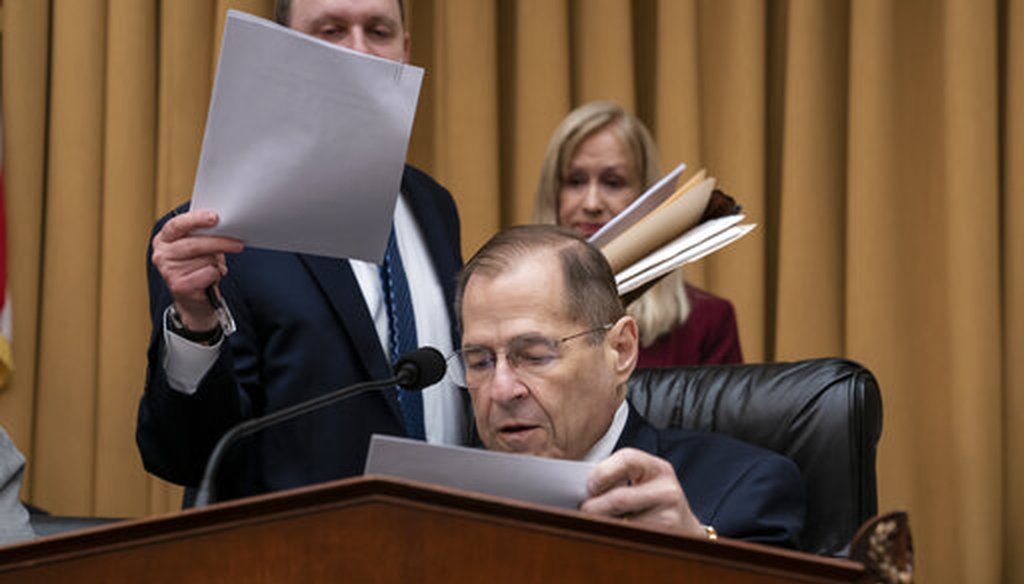Get PolitiFact in your inbox.

House Judiciary Committee Chair Jerrold Nadler, D-N.Y., moves ahead with a vote to hold Attorney General William Barr in contempt of Congress on May 8, 2019. (AP)
Inaugurating yet another phase in the battle over Special Counsel Robert Mueller’s final report, the Trump White House on May 8 officially asserted executive privilege over the report’s unreleased and underlying materials.
Let’s use this opportunity to take a closer look at what executive privilege is.
What is executive privilege?
Executive privilege has been asserted frequently by presidents, even though it’s not written into the Constitution.
The National Constitution Center points to this definition by George Mason University professor Mark Rozell: Executive privilege is "the right of the president and high-level executive branch officers to withhold information from Congress, the courts, and ultimately the public."
Rozell wrote that the privilege can be asserted for two reasons: for national security needs, and for "protecting the privacy of White House deliberations when it is in the public interest to do so."
How often has it been used?
In one form or another, executive privilege dates back to George Washington, though the first president to call it by that name was President Dwight Eisenhower, according to the National Constitution Center.
Executive privilege was most famously asserted by President Richard Nixon during Watergate, when he sought to keep secret the tapes that had been made of conversations in the Oval Office.
Nixon’s assertion of the privilege was widely seen as self-serving and against the public interest, and the next few presidents didn’t assert it often. "Invoking privilege makes it look like the president is trying to hide something," said Josh Chafetz, a Cornell University law professor.
Even when he was facing the Iran-Contra investigation during his second term, President Ronald Reagan decided against asserting executive privilege, said Malcolm Byrne, deputy director and director of research with the National Security Archive. Reagan ended up providing extracts to congressional committees instead, Byrne said.
Eventually, presidents did begin to assert executive privilege again.
President Bill Clinton, during the investigation into his affair with Monica Lewinsky. President Barack Obama also asserted the privilege during the investigation into the "Fast and Furious" program, in which federal agents allowed guns to be sold and brought into Mexico so they could trace the weapons.
Did it work?
Such legal arguments didn’t work, except when the asserted privilege involved national security matters.
Executive privilege took a body blow in the unanimous Supreme Court ruling in U.S. vs. Nixon. The court ruled that Nixon had to turn over the White House tapes, rejecting any national security concerns and concluding that the tapes should be released due to the "fundamental demands of due process of law in the fair administration of criminal justice." The ruling hastened Nixon’s resignation.
Presidents’ records in the courts haven’t improved since then. Clinton lost his court battle over executive privilege, as did Obama. Both rulings built on the jurisprudence in the Nixon case.
This doesn’t appear to be bothering Trump.
"Nixon used executive privilege to conceal his guilt," Tulane University law professor Stephen Griffin said. Trump seems to be "willing to cross that line."
Might the courts change their mind about executive privilege this time?
Legal experts said Trump may think that the courts, bolstered by recent Republican appointees, might rule differently today.
"I think this president wants to challenge U.S. vs. Nixon," said James D. Robenalt, an attorney with the firm Thompson Hine LLP and creator of a continuing legal education class on Watergate. "My perception is that he believes the Supreme Court as now constituted may be willing to take a more expansive view of presidential powers, including executive privilege."
Robenalt added that Attorney General William Barr -- who urged Trump to take this action -- is a supporter of an expansive view of presidential powers, so Trump’s Justice Department wouldn’t be an obstacle to this course of action.
How long could it take to sort out this issue?
The duration of the legal process may be the biggest advantage for the Trump White House.
Even if history suggests that Trump holds a weak legal argument, it would take months for various levels of courts to hear the case and issue their rulings -- perhaps approaching Election Day 2020. During this period, the administration would be able to keep secret the information that Congress wants.
Ultimately, the Trump White House’s executive privilege strategy "is probably a stall," said Mark Osler, a law professor at the University of St. Thomas.
Our Sources
William Barr, letter to Donald Trump, May 8, 2019
National Constitution Center, "When Presidents use executive privilege," March 24, 2017
Oyez.org, U.S. vs. Nixon, accessed May 8, 2019
New York Times, "Trump Asserts Executive Privilege Over Full Mueller Report," May 8, 2019
Washington Post, "House panel votes to hold Barr in contempt; Trump asserts executive privilege over Mueller report," May 8, 2019
Roll Call, "House Judiciary votes to hold Barr in contempt over Mueller report release," May 8, 2019
PolitiFact, "A guide to possible paths to impeachment (or not) in the House," April 26, 2019
Email interview with Steve Griffin, Tulane University law professor, April 25, 2019
Email interviews with Mark Osler, University of St. Thomas law professor, April 25 and May 8, 2019
Email interview with Josh Chafetz, Cornell University law professor, April 25, 2019
Email interview with Malcolm Byrne, deputy director and director of research with the National Security Archive, April 25, 2019
Interviews with James D. Robenalt, attorney with the firm Thompson Hine LLP and creator of a continuing legal education class on Watergate, April 25 and May 8, 2019










































